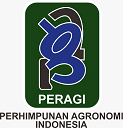The Effect of Application of Diplazium Esculentum Leaf Extracts and GA3 on the Berry Quality of Grape (Vitis Vinifera L.) Cultivar of ‘Prabu Bestari’
Abstract
This study investigated the effect of extract of Diplazium esculentum leaves and GA3 on the berry quality of Vitis vinifera c.v. Prabu Bestari. The objective of this research was to find out the effect of the application of D. esculentum leaf Extract and GA3 on the berry quality of grape c.v. Prabu Bestari. This study was conducted in the Vineyard at the Experimental Station of the Faculty of Agriculture, Udayana University during April to October 2021. A total of five different treatments were applied on inflorescences of grape (by dipping them), i.e. T0= control, only distilled water; T1 = 200 cc leaf extract was diluted with distilled water in to 1 L (200 cc L-1); T2=400 cc L-1; T3 = 600 cc L-1; T4= 500 ppm GA3 (as control positive). There were five treatments arranged in a randomized block design with 6 repetition. The results showed that all treatments were not able to induce seedless, as seeds still presented inside berries, however, the number of seeds in the treatment of 500 ppm GA3 reduced significantly compared to other treatments. Weight per seed decreased significantly at 400 cc L-1 D. esculentum extract, 600 cc L-1 D esculentum extract and 500 ppm GA3.
Keywords
Full Text:
PDFReferences
Astawa, I. N. G., Dwiyani, R., Mayadewi, N. I. N. A., & Sukewijaya, I. M. (2016). Aplikasi Ekstrak Hasil Fermentasi Biji Jagung dan Rebuffing untuk Meningkatkan Mutu Buah Anggur Bali (Vitis vinifera L. var. Alphonso Lavallee). Agrotrop, 6(2), 154–160.
Astawa, I. N. G., & Khalimi, K. (2023). Penemuan Kandungan Asam Giberelin (GA3) pada Ekstrak Beberapa Jenis Tumbuhan. 13(1), 150–156.
Astawa, I. N. G., Mayadewi, N. N. A., Sukewijaya, I. M., Pradnyawathi, N. L. M., & Dwiyani, R. (2015). Perbaikan Kualitas Buah Anggur Bali (Vitis Vinifera L.. Var. Alphonso Lavallee) melalui Aplikasi GA3 sebelum Bunga Mekar. Agrotrop, 5(1), 37–41.
Bilkay, I. S., Karakoç, Ş., & Aksöz, N. (2010). Indole-3-acetic acid and gibberellic acid production in Aspergillus niger. Turkish Journal of Biology, 34(3), 313–318. https://doi.org/10.3906/biy-0812-15
Camara, M. C., Vandenberghe, L. P. S., Rodrigues, C., de Oliveira, J., Faulds, C., Bertrand, E., & Soccol, C. R. (2018). Current advances in gibberellic acid (GA3) production, patented technologies and potential applications. Planta, 248(5), 1049–1062. https://doi.org/10.1007/s00425-018-2959-x
Cheng, C., Xu, X., Singer, S. D., Li, J., Zhang, H., Gao, M., Wang, L., Song, J., & Wang, X. (2013). Effect of GA3 Treatment on Seed Development and Seed-Related Gene Expression in Grape. PLoS ONE, 8(11), e80044. https://doi.org/10.1371/journal.pone.0080044
Cristina Agulheiro-Santos, A., Laranjo, M., & Ricardo-Rodrigues, S. (2021). Table Grapes: There Is More to Vitiviniculture than Wine in Grapes and Wine. IntechOpen. https://doi.org/10.5772/intechopen.99986
Dimovska, V., Ivanova, V., Salamovska, A., & Ilieva, F. (2014). Flame Seedless grape variety (Vitis vinifera L.) and different concentration of gibberellic acid (GA3). Bulgarian Journal of Agricultural Science, 20(1), 137–142.
El-Salhy, A. M., Ebtsam, M. F., Eman, A. A., & Mona, M. D. (2019). Effect of GA3 and some plant extracts spraying on fruiting of Early Sweet Seedless grapevines. SVU-International Journal of Agricultural Sciences, 1(2), 54–63. https://doi.org/10.21608/svuijas.2019.67129
Essien, E. E., Ascrizzi, R., & Flamini, G. (2019). Characterization of Volatile Compounds of Diplazium esculentum. Chemistry of Natural Compounds, 55(5), 958–959. https://doi.org/10.1007/s10600-019-02860-y
Gao, X., Wu, M., Sun, D., Li, H., Chen, W., Yang, H., Liu, F., Wang, Q., Wang, Y., Wang, J., & He, F. (2020). Effects of gibberellic acid (GA3) application before anthesis on rachis elongation and berry quality and aroma and flavour compounds in Vitis vinifera L. “Cabernet Franc” and ’ Cabernet Sauvignon’ grapes. Journal of the Science of Food and Agriculture, 100(9), 3729–3740. https://doi.org/10.1002/jsfa.10412
García-Rojas, M., Meneses, M., Oviedo, K., Carrasco, C., Defilippi, B., González-Agüero, M., León, G., & Hinrichsen, P. (2018). Exogenous gibberellic acid application induces the overexpression of key genes for pedicel lignification and an increase in berry drop in table grape. Plant Physiology and Biochemistry, 126, 32–38. https://doi.org/10.1016/j.plaphy.2018.02.009
Gupta, R., & Chakrabarty, S. K. (2013). Gibberellic acid in plant. Plant Signaling & Behavior, 8(9), e25504. https://doi.org/10.4161/psb.25504
Kadir, M. F., Bin Sayeed, M. S., Setu, N. I., Mostafa, A., & Mia, M. M. K. (2014). Ethnopharmacological survey of medicinal plants used by traditional health practitioners in Thanchi, Bandarban Hill Tracts, Bangladesh. Journal of Ethnopharmacology, 155(1), 495–508. https://doi.org/10.1016/j.jep.2014.05.043
Karaagac, E., Vargas, A. M., de Andrés, M. T., Carreño, I., Ibáñez, J., Carreño, J., Martínez-Zapater, J. M., & Cabezas, J. A. (2012). Marker assisted selection for seedlessness in table grape breeding. Tree Genetics & Genomes, 8(5), 1003–1015. https://doi.org/10.1007/s11295-012-0480-0
Leovici, H., Kastono, D., & Putra, E. T. S. (2014). Pengaruh Macam dan Konsentrasi Bahan Organik Sumber Zat Pengatur Tumbuh Alami terhadap Pertumbuhan Awal Tebu (Saccharum officinarum L.). Vegetalika, 3(1), 22–34.
Machado, C. M. M., Oliveira, B. H., Pandey, A., & Soccol, C. R. (2000). Coffee Husk as Substrate for the Production of Gibberellic Acid by Fermentation. In Coffee Biotechnology and Quality (pp. 401–408). Springer Netherlands. https://doi.org/10.1007/978-94-017-1068-8_37
Machado, C. M. M., Soccol, C. R., De Oliveira, B. H., & Pandey, A. (2002). Gibberellic Acid Production by Solid-State Fermentation in Coffee Husk. Applied Biochemistry and Biotechnology, 102–103(1–6), 179–192. https://doi.org/10.1385/ABAB:102-103:1-6:179
Pahi, B., Rout, C. K., & Saxena, D. (2020). Effects of gibberellic acid (GA3) on quality and yield in grapes. International Journal of Chemical Studies, 8(6), 2362–2367. https://doi.org/10.22271/chemi.2020.v8.i6ah.11126
Poudel, P., Atreya, P. N., & Dahal, K. C. (2022). Effect of Gibberellic Acid (GA3) on Yield and Fruit Quality of Table Grape var. Himrod in Kathmandu Valley, Nepal. Journal of Agriculture and Environment, 23(1), 131–142. https://doi.org/10.3126/aej.v23i1.46922
Romero, I., Vazquez-Hernandez, M., Maestro-Gaitan, I., Escribano, M. I., Merodio, C., & Sanchez-Ballesta, M. T. (2020). Table Grapes during Postharvest Storage: A Review of the Mechanisms Implicated in the Beneficial Effects of Treatments Applied for Quality Retention. International Journal of Molecular Sciences, 21(23), 9320. https://doi.org/10.3390/ijms21239320
Semwal, P., Painuli, S., Painuli, K. M., Antika, G., Tumer, T. B., Thapliyal, A., Setzer, W. N., Martorell, M., Alshehri, M. M., Taheri, Y., Daştan, S. D., Ayatollahi, S. A., Petkoska, A. T., Sharifi-Rad, J., & Cho, W. C. (2021). Diplazium esculentum (Retz.) Sw.: Ethnomedicinal, Phytochemical, and Pharmacological Overview of the Himalayan Ferns. Oxidative Medicine and Cellular Longevity, 2021, 1–15. https://doi.org/10.1155/2021/1917890
Sun, W., Liu, C., Luo, J., Niu, C., Wang, J., Zheng, F., & Li, Q. (2020). Residue analysis of gibberellic acid isomer (iso-GA3) in brewing process and its toxicity evaluation in mice. Regulatory Toxicology and Pharmacology, 110, 104514. https://doi.org/10.1016/j.yrtph.2019.104514
Tag, H., Kalita, P., Dwivedi, P., Das, A. K., & Namsa, N. D. (2012). Herbal medicines used in the treatment of diabetes mellitus in Arunachal Himalaya, northeast, India. Journal of Ethnopharmacology, 141(3), 786–795. https://doi.org/10.1016/j.jep.2012.03.007
Urbanova, T., & Leubner-Metzger, G. (2016). Gibberellins and seed germination. In Annual Plant Reviews, Volume 49 (pp. 253–284). John Wiley & Sons, Ltd. https://doi.org/10.1002/9781119210436.ch9
Van der Vyver, L. (2016). The influence of gibberellic acid (GA₃) for berry thinning and berry sizing on table grape production, quality and fertility of Prime. Stellenbosch: Stellenbosch University.
Wilson, D. (2021). Chemical Sensors for Farm-to-Table Monitoring of Fruit Quality. Sensors, 21(5), 1634. https://doi.org/10.3390/s21051634
Xie, S., Liu, Y., Chen, H., Yang, B., Ge, M., & Zhang, Z. (2022). Effects of gibberellin applications before flowering on the phenotype, ripening, and flavonoid compounds of Syrah grape berries. Journal of the Science of Food and Agriculture, 102(13), 6100–6111. https://doi.org/10.1002/jsfa.11962
Xu, Y., Hou, X., Feng, J., Khalil-Ur-Rehman, M., & Tao, J. (2019). Transcriptome sequencing analyses reveals mechanisms of eliminated russet by applying GA3 and CPPU on ‘Shine Muscat’ grape. Scientia Horticulturae, 250, 94–103. https://doi.org/10.1016/j.scienta.2019.02.048
Zannah, F., Amin, M., Suwono, H., & Lukiati, B. (2017). Phytochemical screening of Diplazium esculentum as medicinal plant from Central Kalimantan, Indonesia. AIP Conference Proceedings, 050001. https://doi.org/10.1063/1.4983439
Refbacks
- There are currently no refbacks.


























